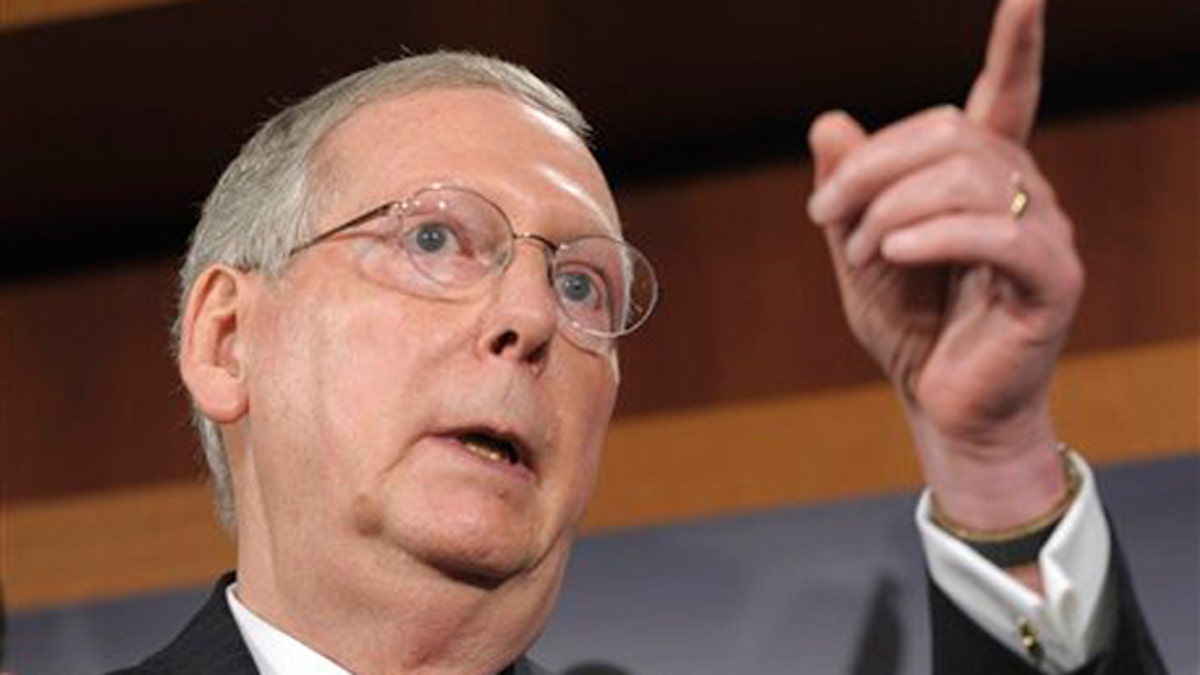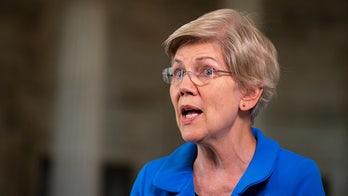
July 12: Senate Minority Leader Mitch McConnell gestures during a news conference on Capitol Hill. (AP)
Senate Republican Leader Mitch McConnell's debt-ceiling contingency plan is either a deft political stroke or a sellout of epic magnitude -- depending on who's looking at it.
Unfortunately for the GOP, this debate is playing out among Republicans.
McConnell's plan has created a rift among conservatives torn over whether the Kentucky senator is making the best of a bad situation or buckling under pressure. The intra-party dispute only adds to the confusion and uncertainty as Congress tracks, without a deal, toward what the administration claims is an Aug. 2 deadline to raise the debt ceiling or face default.
Under McConnell's Plan B, the onus would be on President Obama to request a debt-ceiling increase from Congress -- and, along with that, propose spending cuts, in three separate sets of votes. The vital catch is that Congress would vote each time on a resolution to disapprove of the debt-ceiling request. That means Congress would have to muster a two-thirds majority to override a presidential veto and prevent the increase.
The upside for Republicans is that more of them could vote against the increase without imperiling the measure and putting the U.S. in a position where, according to the Treasury Department, default is just around the corner.
The downside for Republicans is that the move could result in a clean debt-ceiling increase -- with no cuts attached, particularly entitlement reforms that some lawmakers have been pushing.
Conservative lawmakers, commentators and activists pulled no punches in decrying the McConnell contingency as a sellout.
Conservative blogger Erick Erickson dubbed the proposal the "Pontius Pilate Pass the Buck Act of 2011."
FreedomWorks urged McConnell to "find his spine."
South Carolina Sen. Jim DeMint, in an interview with CBS News on Wednesday, criticized the plan as something that makes it easier for the government to spend and borrow.
ForAmerica Chairman Brent Bozell said in a statement that the proposal is the "sort of shenanigans that got Republicans thrown out of power in 2006."
"If Mitch McConnell thinks caving to President Obama and allowing him to raise the debt ceiling without cuts is the way to become Senate Majority Leader he is sorely mistaken," Bozell said.
Despite the perceived friction at the top, however, GOP leaders say everybody's "on the same page." And they downplayed the pushback on McConnell's plan.
"I really don't know where some of that's coming from," Republican Party Chairman Reince Priebus told Fox News on Wednesday.
"There needs to be a backup plan if we are unable to come to an agreement. And, frankly, I think Mitch has done good work," Boehner told Fox News on Tuesday.
"We'd far prefer a bipartisan deal to cut spending and reform entitlements without a tax increase," added the editorial page of The Wall Street Journal. "But if Mr. Obama won't go along, there's no reason Republicans should help him dodge the political consequences by committing debt-limit harakiri."
House Republican Leader Eric Cantor offered a more tepid assessment in addressing McConnell's approach, telling reporters that he acknowledges the plan's existence.
As GOP leaders try to convince their caucus they're not ceding ground to Democrats, the fact that Democrats are lining up to praise McConnell might undercut that effort.
Senate Democratic Leader Harry Reid on Wednesday commended McConnell for his effort.
White House Press Secretary Jay Carney likewise issued a statement saying McConnell's plan "reaffirmed" that the U.S. cannot default on its bills. He clarified Wednesday that the McConnell plan is a "fallback," and not the "preferred" option.
"If both sides are getting what they want, it's probably a bad proposal," Rep. David Schweikert, R-Ariz., told Fox News.
Still, even some Democrats took issue with the plan, claiming McConnell was throwing up his hands and passing the buck to the president.
"This is a backbone-free proposal," Rep. Peter Welch, D-Vt., said Wednesday.




